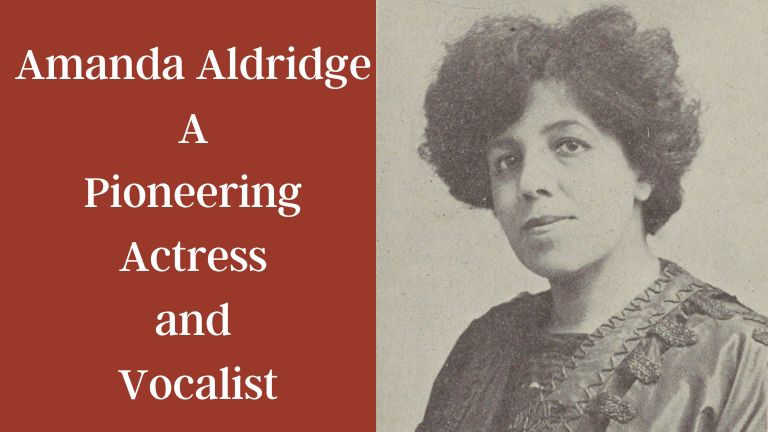Amanda Aldridge was a pioneering actress and vocalist of the 19th century who broke down racial barriers and paved the way for future generations of Black performers. Despite facing immense discrimination and obstacles throughout her career, Aldridge became a successful performer and trailblazer, leaving behind a legacy that continues to inspire artists today.
Early Life and Career Beginnings
Amanda Aldridge was born on March 10, 1866, in London, United Kingdom. Her father, Ira Frederick Aldridge, was a renowned Shakespearean actor who became the first Black actor to play Othello on the London stage in 1907 and 1925. Her mother, Margaret Gill, was an English ballerina.
Aldridge grew up surrounded by the arts and began her career as a singer and actress at a young age. She performed in several productions alongside her father and eventually began touring with her own theatrical troupe.
The Struggle for Success
Despite her talent and connections, Aldridge faced immense discrimination and prejudice throughout her career. Many theaters refused to hire her because of her race, and she often had to perform in Blackface to be allowed on stage.
Despite these obstacles, Aldridge continued to push forward and challenge societal norms. In 1893, she became the first Black performer to sing at the prestigious Covent Garden opera house in London, a major accomplishment that earned her critical acclaim and opened doors for other Black performers.
Breaking Down Barriers
Throughout her career, Amanda Aldridge worked tirelessly to break down racial barriers and pave the way for future generations of Black performers. She often spoke out against discrimination and racism in the entertainment industry and used her platform to advocate for change.
Aldridge’s legacy continues to inspire performers today, as her determination, talent, and trailblazing spirit serve as a reminder of the power of perseverance and the importance of representation in the arts.
Legacy and Impact
Amanda Aldridge’s impact on the entertainment industry cannot be overstated. She was a true trailblazer, breaking down racial barriers and opening doors for future generations of Black performers.
Aldridge’s determination and talent paved the way for other Black performers to enter the industry and achieve success. Her advocacy for change and vocal opposition to discrimination helped to challenge societal norms and promote equality in the arts.
Today, Aldridge’s legacy continues to inspire artists and performers around the world. Her story serves as a powerful reminder of the importance of representation and the need to challenge systemic discrimination and racism in all its forms.
Amanda Aldridge’s Contributions to Music and Theatre
Throughout her career, Amanda Aldridge made significant contributions to both music and theatre. As a vocalist, she was known for her powerful and soulful performances, which earned her critical acclaim and helped to establish her as a force to be reckoned with in the music industry.
Aldridge also made a significant impact in theatre, both as an actress and as a trailblazer. She challenged societal norms and broke down racial barriers, using her platform to advocate for change and push for greater equality in the arts.
Amanda Aldridge’s Legacy of Advocacy
Amanda Aldridge’s legacy is not just one of talent and success, but also of advocacy and activism. Throughout her career, she spoke out against discrimination and racism in the entertainment industry, using her platform to promote change and challenge societal norms.
Aldridge’s activism and advocacy helped to pave the way for future generations of Black performers, who continue to benefit from her trailblazing spirit and commitment to equality in the arts.
Amanda Aldridge Wikipedia Link
| Information | Links |
|---|---|
| Amanda Aldridge’s Wikipedia page | https://en.wikipedia.org/wiki/Amanda_Aldridge |
Conclusion
Amanda Aldridge was a true pioneer in the entertainment industry, breaking down racial barriers and paving the way for future generations of Black performers. Her determination, talent, and trailblazing spirit continue to inspire artists and performers today, serving as a powerful reminder of the importance of representation and the need to challenge systemic discrimination and racism in all its forms.
Frequently Asked Questions (FAQs)
What kind of music did Amanda Aldridge perform?
Amanda Aldridge was a vocalist who performed a variety of styles, including classical and popular music.
Did Amanda Aldridge face discrimination in the entertainment industry?
Yes, Amanda Aldridge faced discrimination and racism throughout her career due to her race.
What was Amanda Aldridge’s most significant contribution to the arts?
Amanda Aldridge’s most significant contribution to the arts was breaking down racial barriers and paving the way for future generations of Black performers.
How did Amanda Aldridge advocate for change in the entertainment industry?
Amanda Aldridge spoke out against discrimination and racism in the entertainment industry and used her platform to promote change and challenge societal norms.
Why is Amanda Aldridge’s legacy important?
Amanda Aldridge’s legacy is important because it serves as a powerful reminder of the importance of representation and the need to challenge systemic discrimination and racism in all its forms.

